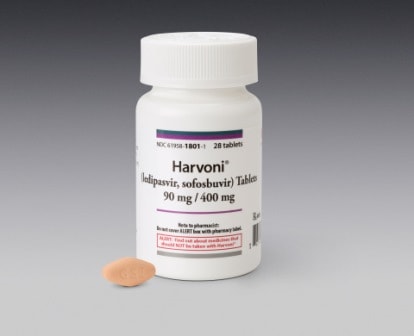What Impact Does Hepatitis C Have on Your Weight?


The impact of the hepatitis C virus (HCV) in America is no joke. Not just on our livers, but also on our waistline. According to the U.S. Centers For Disease Control an estimated, “41,200 acute hepatitis C cases occurred in 2016.” Factor in population growth and it looks like hepatitis C in 2019 affects .93% of the U.S. population (2).
While the causes and symptoms can vary greatly, one of the major concerns surrounding hepatitis C is how it affects weight. Weight fluctuations are also a side effect of some of the most common hepatitis C medications on the market. If you’re trying to figure out whether or not hepatitis C causes rapid weight gain or if weight gain is a sign of a hepatitis C flare up, read on.
Below you’ll learn all you need to know about how hepatitis C can tip the scales.
Does Hepatitis C Make You Lose Weight?
Symptoms of hepatitis C and steatosis (a presence of fat in liver cells) range from fever and fatigue to loss of appetite, nausea, and vomiting. We mention steatosis because it occurs in over 50% of chronic hepatitis C sufferers with associations with increased hepatic fibrosis (3).
With symptoms like those, it’s no surprise that weight loss and HCV go hand in hand. For many hepatitis C suffers, nausea makes it difficult to keep food down. But in order to even take food in you need to have an appetite. Together, loss of appetite and nausea create a vicious cycle that often leads to involuntary weight loss in hepatitis C patients.
A study published in The BMJ back in 2002 concluded that “weight loss in patients with chronic hepatitis C may be associated with a reduction in steatosis and abnormal liver enzymes and improvement in fibrosis, despite the persistence of the virus.”And while this study has its flaws, collecting data from a relatively small sample of HCV patients, it does seem to reinforce that weight loss and hepatitis C are tied together.
If weight loss and HCV are correlated, the reciprocal question becomes, “is gaining weight a sign of a HCV flare up?” All indications point to no.
Weight loss is often a sign of chronic or prolonged hepatitis C and the likelihood of experiencing other symptoms first is much more likely. Weight gain is not a symptom; however, weight and obesity, in particular, have long been known to be risk factors leading to all different types of liver disease and cirrhosis (7).
Medications and Weight
With a handful of common FDA approved HCV medications on the market, knowing which one is best for you is important, especially if weight is a concern.
Harvoni & Mavyret – You may be asking yourself, “does Harvoni make you gain weight?”
While it does have a relatively long list of side effects including:
- fatigue
- headache
- nausea
- and insomnia,
weight gain is not one of them.
Nausea, however, a known side effect, may indirectly contribute to weight loss. The same holds true for Mavyret, another new and popular HCV drug. No study exists suggesting that Mavyret or Harvoni cause weight loss directly, but their known side effects can indirectly contribute to eating less and thus losing weight.
Ribavirin & Interferon – Often prescribed in tandem, Ribavirin and Interferon, in particular, are known to cause weight loss (4). According to a large study published in the Journal of the Pakistan Medical Association, 67% of their 260 person sample pool experienced significant weight loss during the Interferon and Ribavirin treatment period (4). Although, the weight tended to come back in the months following HCV treatment.
In terms of your weight, it would appear that weight loss is an indirect, but common side effect of both hepatitis C and its leading treatments.
What You Can Do
Eating right, light or moderate physical activity, and using supplements are all potential ways to help manage the weight fluctuations commonly associated with HCV and its most common medications.
The number one diet rule is no alcohol. Whether you have hep C or not, alcohol is never good for your weight and it’s a huge tax on your liver to process.

Vegetables, however, are always a great addition to any HCV patient’s diet. The more fibrous the better!
In terms of keeping down food and bolstering your appetite, The Mayo Clinic in Arizona has some great suggestions.
- Eat smaller meals throughout the day to reduce digestive stress and nausea (5).
- Odor can be a trigger for nausea so try to eat foods that can be served cold in order to reduce their smell (5).
- Steer clear of spicy foods, too much dairy, or greasy foods, and try taking a short walk before mealtime to settle the stomach and prime the digestive system (5).
Conclusion
But before making any changes to your diet or behavior make sure to consult your healthcare provider. And not only that, but be sure to ask the right questions when it comes to your hepatitis C treatment plan.
Making sure the hepatitis medication being prescribed is the right one for you and also that you understand how to use it and any potential side effects are important. Keep in mind that if any questions arise after visiting your doctor, any medication you may be prescribed likely has a 24/7 support number.
If you do suffer from or suspect that you have hepatitis C and are experiencing weight loss don’t be alarmed. Consult your physician to get a diagnosis if you haven’t already and start down the treatment path that’s right for you. HCV and the side effects are very treatable, with better and more affordable medications hitting the market all the time.
1. https://www.cdc.gov/hepatitis/hcv/hcvfaq.htm, U.S. Centers For Disease Control, “Hepatitis C Questions and Answers for Health Professionals,” last updated: April 30, 2018, Retrieved January 13, 2019
2. https://www.jwatch.org/na48277/2019/01/11/prevalence-hepatitis-c-virus-us, NEJM Journal Watch, “Prevalence of Hepatitis C Virus in the U.S,” By Carlos del Rio, MD , Published January 11, 2019, Retrieved January 13, 2019
3. https://gut.bmj.com/content/51/1/89, The BMJ, “Effect of weight reduction on liver histology and biochemistry in patients with chronic hepatitis C,” By J Hickman1, D Clouston, G A Macdonald, D M Purdie, J B Prins, S Ash, J R Jonsson, E E Powell, Published July, 2002, Retrieved January 13, 2019
4. https://www.ncbi.nlm.nih.gov/pubmed/23866417, Journal of the Pakistan Medical Association, “Weight loss with interferon and ribavirin therapy in chronic hepatitis C patients,” By Sajjad SF, Ahmed Wu, Arif A, Alam SE, Waquar J., Published November 2012, Retrieved January 13, 2019
5. https://www.mayoclinic.org/diseases-conditions/hepatitis-c/in-depth/hepatitis-c-drug-side-effects/art-20121674, The Mayo Clinic, “Coping with the side effects of hepatitis C drugs,” Published Sept 27, 2018, Retrieved January 13, 2019
6. https://www.rxlist.com/harvoni-side-effects-drug-center.htm, RxList, “Harvoni,” By John P. Cunha, DO, FACOEP, Last Reviewed April 27, 2017, Retrieved January 13, 2019
7. https://www.ncbi.nlm.nih.gov/pubmed/3319904, GastroenterologyClinics of North America, “Fatty liver disease in morbid obesity,” By Clain DJ, Lefkowitch JH, Published June 1987, Retrieved January 13, 2019








